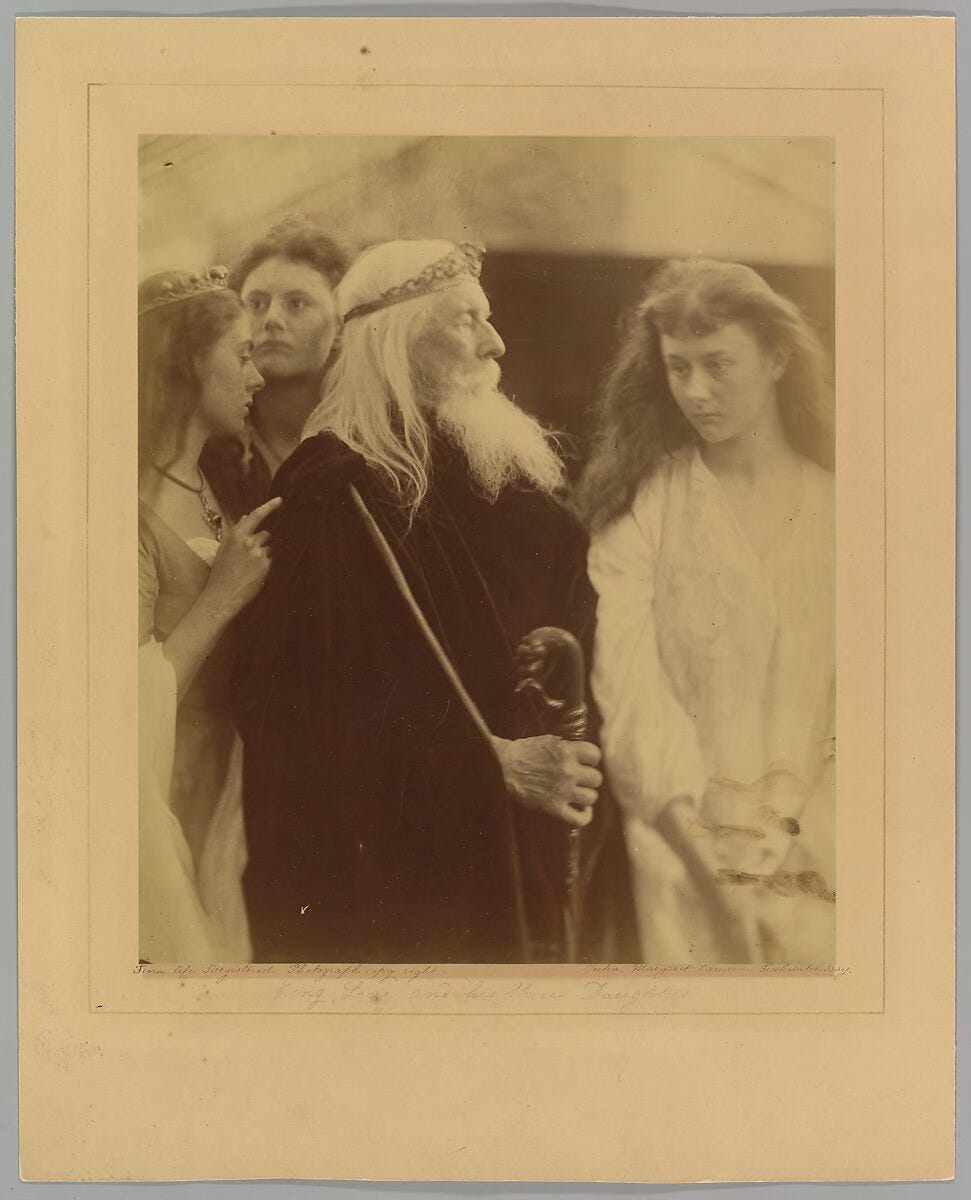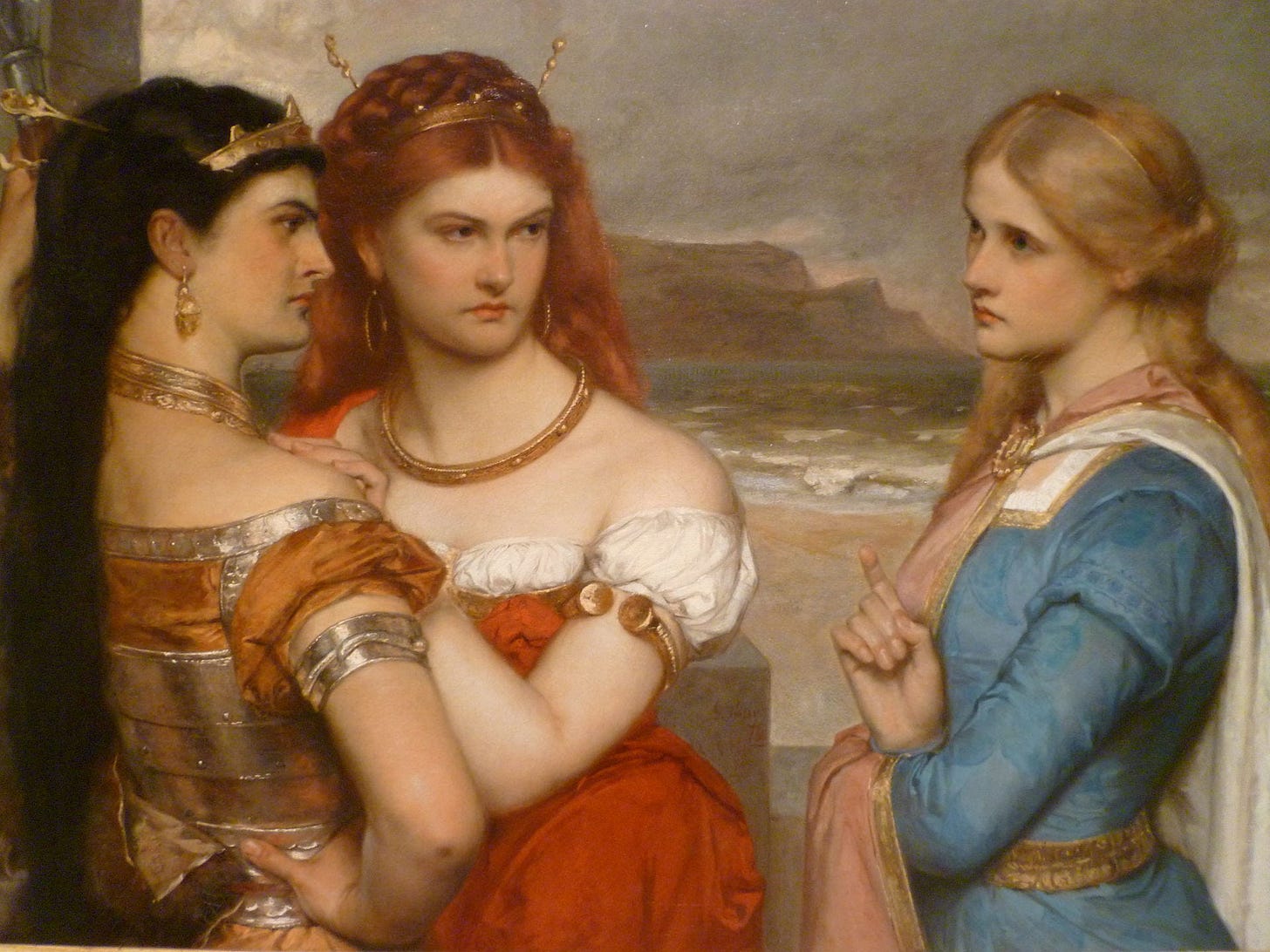King Lear is on my mind. Last week I took a day trip to NYC with a friend to see Kenneth Branagh playing Lear at The Shed at the Hudson Yards. It’s a play I’ve studied twice - once in 6th year at school (that’s the final year of high school in Scotland), and again as an undergraduate student of English at the University of Leeds. Before last week, I’d never seen it live.
Back in the day, I remember (vaguely - lol) being focused on Lear’s madness, on the role of his fool, and on the unparalleled treachery of daughters plotting to kill their father. Some lines just stick… like this one:
How sharper than a serpent’s tooth it is to have a thankless child
But what about Goneril, Regan, and Cordelia as sisters, rather than daughters? The more I think about them, the more questions I have. Let’s cover the basic events.
Initially, Goneril and Regan are of the same mind. They’re ready to play the flattery game to win a third each of their father’s kingdom for themselves and their husbands, Albany and Cornwall, respectively. Cordelia won’t play and so gets banished, not to be seen again until Act IV, scene VII. There’s just a brief interchange between the three before she goes:
Cordelia: The jewels of our father, with wash’d eyes/ Cordelia leaves you: I know you what you are;/ And like a sister am most loth to call/ Your faults as they are named. Love well our father:/ To your professed bosoms I commit him:/ But yet, alas! stood I within his grace,/ I would prefer him to a better place./ So farewell to you both.
Regan: Prescribe not us our duty.
Goneril: Let your study/ Be to content your lord, who hath receiv’d you/ At Fortune’s alms; you have obedience scanted,/ And well are worth the want that you have wanted.
Cordelia: Time shall unfold what plighted cunning hides;/ Who covers faults, at last with shame derides./ Well may you prosper!
Or more simply…
Cordelia: I’m way too nice to say what I really think of you two. Things look bad for our father.
Regan: Don’t tell us what to do, little sister.
Goneril: You’re lucky the King of France will still have you. Be grateful. You got what you deserved.
Cordelia: Karma is a bitch. Good luck (not).
Cordelia leaves, never to meet her sisters again, and Goneril and Regan agree that their father, who has always been rash, is definitely losing it. He’s banished their sister, who they both know he loves more than them, and if he carries on like this, his plan to abdicate and live month-about with each of them is not going to go well.
While there’s no love lost here, and little text to go on, I sense a hint of an older sister dynamic at play. Goneril has advice for Cordelia - you could almost call it motherly - and it has me wondering about what the age gaps might be here, as well as what has happened to Lear’s queen who, I’m pretty certain, never rates a mention. How old were the sisters when their mother (presumably) died? How much of a mothering role has Goneril taken with her younger siblings?
Back to the story. With Cordelia off to France, Lear takes his first month with Goneril and things go badly. She’s unimpressed with her father’s raucous retinue of 100 men and instructs her servants not to treat him with the level of deference he expects. Lear still thinks he’s a king, but by his own actions he’s become, as Goneril’s man tells, no more than ‘my lady’s father.’ A bust-up ensues and he leaves to go and live with Regan instead, so Goneril quickly writes to advise Regan on how to handle him. When a confrontation takes place between Lear and his two remaining daughters, Regan sides with her older sister (and perhaps mother figure?) and, Lear, in a towering rage, dashes out into a stormy night and a speedy descent into madness. At this point, at the close of Act II, both sisters seem as bad as each other, although there’s arguably more than a grain of truth in Goneril’s comment that Lear deserves what’s coming to him:
’Tis his own blame; hath put himself from rest,/ And must needs taste his folly.
Goneril and Regan are back on stage in Act III, scene VII, and sisterly harmony remains, demonstrated by their joint desire for Lear’s faithful Lord Gloucester to be found and condemned. “Hang him instantly,” says Regan, while Goneril says “Pluck out his eyes.” Goneril’s off stage by the time her brother-in-law, Cornwall, does just that to Gloucester - she’s with Gloucester’s treacherous, bastard son, Edmund, and this is where the sister trouble begins. The next time we see Goneril, in Act IV, scene II, she’s in love with Edmund, and disgusted by her ‘mild’ husband Albany. He’s not man enough and she has her sights set on Edmund. But then a letter arrives from Regan declaring that Cornwall has died after a being wounded while blinding Gloucester. Immediately, Goneril is afraid her plans will be spoilt. Her sister, now widowed, may take Edmund for herself and ruin everything.
Let’s take a minute to think about why Goneril is so keen on Edmund and so afraid to lose him to her sister. Again, I’m wondering, how old is she? And perhaps, how desperate to have a child? Here’s her father, King Lear, back in Act I, in the speech that ends with the famous quote above about serpent’s teeth and thankless children. Because Lear has a lot to say to Goneril:
Hear, Nature, hear! dear Goddess, hear!/ Suspend thy purpose, if thou didst intend/ To make this creature fruitful!/ Into her womb convey sterility!/ Dry up in her the organs of increase,/ And from her derogate body never spring/ A babe to honour her!
Does Lear know fertility is a sore point for his daughter? On top of any natural desire for children, producing heirs was a vital function for royal women. In his rage, is Lear trying to hit her where it would hurt the most?

If it seems like a leap for Goneril to fear that Regan will make a play for Edmund… it’s not. In Act IV scene V, Regan meets her sister’s servant, Oswald who is carrying a letter from Goneril to Edmund. Suspicion is a two-way street in this sister story, and Regan tells Oswald she and Edmund have talked and plan to marry. She knows Goneril has her eye on Edmund, and instructs Oswald to tell her sister that that ship has sailed. Regan wants to open the letter Oswald carries, but she does not. Happily for the audience, the letter falls into Edmund’s brother’s hands and we learn from him that Goneril wants Edmund to murder her husband Albany so they can be together.
By the opening of Act V, the sisters’ thoughts are wholly focussed on each other and Edmund. Regan wants assurances from him that he hasn’t slept with her sister. Goneril ‘had rather lose the battle’ than lose Edmund to her sister, and when they meet, although they’re allied on the battlefield against Cordelia, they don’t trust each other around Edmund one inch. It’s really Edmund, though, who neither should trust. Here are his thoughts on the subject:
To both these sisters have I sworn my love;/ Each jealous of the other, as the stung/ Are of the adder. Which of them shall I take?/ Both? one? or neither?
But of course this is Shakespearean tragedy and death is on the way for almost everyone. Regan declares she’s going to marry Edmund and so Goneril poisons her. Yes! Poisons her own sister! Edmund is declared a traitor, Goneril’s letter - and her plan for Edmund to make her a widow - is exposed, and, with Edmund mortally wounded by his brother, Goneril rushes off and takes her own life. Cordelia, for all her moral superiority and goodness, fares no better. Lear, all his daughters, and sundry other folk, all wind up dead. As I said to my friend after the play last Wednesday - Shakespeare’s tragedies are called tragedies for a reason!
One of the things that makes fiction so much more fun than real life, is that there’s no need to be too black and white about things that aren’t real. In the real world, there’s no room for sympathy for Goneril, but in the fictional realm, I feel like it’s possible to interpret her more favorably - as someone who has been more mother than sister, as someone hurt terribly by her father, as someone desperate for a child, perhaps to the point of madness. For me that makes her a little more relatable than the power-hungry, ungrateful villain she’s generally taken for. Although having said that, she did poison her sister. Which means that in the world of sister stories, Goneril might just be the lowest of the low!







